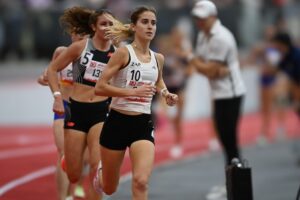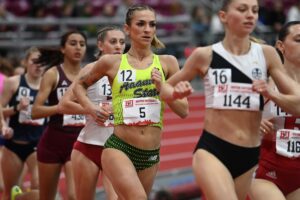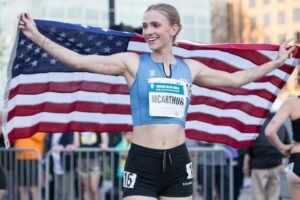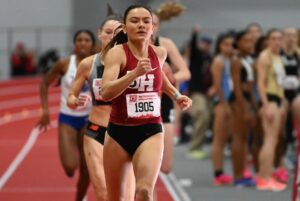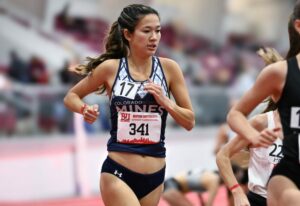
By Alison Wade
In April, 800 meter runner Brenna Detra hit a low point. Despite all the work she was putting in, she had just run 2:04.90 and finished second to last in her race at the Penn Relays. Her mother told her that if the sport wasn’t making her happy, maybe it was time to let it go. Detra, 26, half wondered if she should go back to her college specialty, the 400m hurdles. But deep down, she knew she needed to keep going.
On Friday, May 20, Detra’s breakthrough came. She finished a close third in the 800m at the Trials of Miles Track Night NYC, and became the 71st American woman to break 2:00 in the 800m, running 1:59.94. The time was a personal best by 1.53 seconds and validation that she’s on the right track after making some big changes in the past year, including getting a new coach, putting law school on hold, and leaving the Boston Athletic Association, the team she had run for since graduating from the University of Wisconsin.
Breaking 2:00
One week before Detra’s breakthrough race, she did a 600m-400m-200m workout on the track and broke 1:30 for the 600m for the first time, running 1:28.7. She looked at her training partner and said, “I think I can break 2:00 now.”
But when she arrived at New York City’s Icahn Stadium on race day, doubts crept in. A thunderstorm delayed the start of the race. Detra’s socks were soaking wet and she was shivering, until someone let her borrow a rain jacket. And for a split second, she questioned whether she belonged in the race. Detra does not have an agent, so it falls on her to convince meet directors to put her in faster heats. At the New York City event, she was originally in the “B” heat, until a scratch bumped her into the top heat. Detra thought of her sports psychologist’s advice and told herself, “You belong here. You deserve this. You’re grateful to be here, and to be healthy.”
In the race, Detra hit halfway in 58.05. She told herself to stay attached to the lead pack, and thought of what her coach, Anna Willard Grenier, would tell her: Run smooth and strong on the backstretch, conserve energy, and get ready for the last 200. “I was waiting for the hurt to come, because in the 800 there’s always a point where you’re like, ‘Here it goes,’ but it just never came,” Detra said. “I’ve never felt that good during a race. And then the last 110m, I was like, ‘You could win this.’ I’ve spent so much time being in the middle of the pack and towards the back of races but I didn’t truly believe that I could put myself in a race and almost win it. It was really the first race where it clicked.”
Detra finished 0.14 seconds behind race winner Juliette Whittaker, close enough that Detra, too, hit the finish line tape when she crossed the line. Her name was blurry on the scoreboard, but when she saw the first number next to her name was a one, she leapt into the air.
A blown out knee
Growing up in Peoria, Illinois, Detra was a great all around athlete. She played volleyball, softball, and basketball. And when a softball coach saw her running around the bases one day and remarked how good Detra would be at track and field, she added another sport.
She loved to win and would do whatever it took to get better, “It sounds so cliché, but I would get so mad when I would lose anything,” Detra said. “My mom has really helped me with that. She’s a single mom of three kids, one with a disability, and she never, ever showed me when she was struggling or anything. I was just so focused on my goals and wanting to be the best, because it also reflected what a good mom she is, too. I get emotional thinking about it, but she really instilled my drive and my determination.”
Detra’s father wasn’t in her life, but she says she gets her athletic ability from that side of the family, and her competitiveness from her mom. In high school, Detra continued to play volleyball and basketball, and was a two-time Illinois state champion in the 300m hurdles.
She earned a full scholarship to the University of Wisconsin, where she struggled at first, and put a lot of pressure on herself to perform. “I was scared to death to lose my scholarship and have to go back home and feel like I failed my mom and failed my family,” she said. But her performances gradually came around.
Detra bounced between running the 800m indoors and the 400m hurdles outdoors. Her fourth year of college, in 2017, she qualified for the NCAA Championships for the first time. And on the third hurdle of her opening race, disaster struck. She landed badly and tore her ACL, MCL, LCL, and meniscus, and chipped a piece of bone off her kneecap.
She underwent surgery two weeks later, and she was back in the training room the next day, working on getting her range of motion back. “I never once for a second thought that I wasn’t going to be back,” Detra said. She had to relearn how to walk, and took 16 weeks off from running.
But when Detra could finally run again, all the cross training paid off and she was able to return quickly. By the following outdoor track season, she finished fourth in the 400m hurdles at the Big Ten Championships, ran a personal best of 57.42, and made it back to the NCAA Championships, where she finished 13th in the prelims.
Detra’s surgeon was so impressed with her recovery that he asked her to promise she would keep going until she made it to the Olympics. Her knee still bothers her sometimes, and she might need another surgery someday, but so far, it’s been manageable.
“I don’t regret any of it for a second,” she said. “People go through much harder things than I did. I think it made me have a new appreciation for running, even though it was really hard. I think that everything happens for a reason and that was meant to show that you can overcome anything if you work hard enough.”
A coaching change
After finishing her eligibility at Wisconsin, Detra took a job at Oracle in Boston and her Wisconsin coaches connected her with Ricardo Santos, who was coaching the B.A.A. team at the time. At first, she was just hoping to keep running to stay in shape. “I started realizing, going to the meets my first year, this is a job, this is people’s career,” Detra said. “And I was like, ‘Oh my God, I want this.’”
She was on her own financially, so she needed to keep her full-time job, but Detra decided to focus on the 800m post-collegiately because she thought her ceiling might be higher in that event, plus, she said, “You don’t need hurdles, sleds, wickets, or anything. It’s just kind of running.”
Detra was a member of the B.A.A.’s Racing Team, which came with coaching but less support than the members of the B.A.A. High Performance Team received. And it may have confused potential sponsors into thinking that she already had a sponsor. This year she decided to strike out on her own to see what else is out there. She pays her own way to races, and sees it as an investment in her future. (She took the bus to New York and public transportation to Icahn Stadium to keep her costs low.)
B.A.A. assistant Morgan Uceny had been writing Detra’s workouts for the past two years, but when she left the team, Uceny recommended that Detra reach out to her former training partner, Grenier, and they began working together in August. (Both Uceny and Grenier ran collegiately in the Ivy League before becoming Olympians.)
Detra said Grenier could see what she needed right away. “She saw a gap in my speed and that middle ground between the speed endurance and strength work,” Detra said. “I would really struggle with mile pace or [kilometer] workouts, and she was like, ‘I think we need to start on both ends and fill in the gaps between.’”
Right off the bat, Grenier had Detra doing fast speed, and Detra was initially doubtful. “I was like, ‘How is this going to help? I don’t understand,’” she said. “And she was like, ‘We need to get your speed back, we need to get your confidence back, because that’s your strength.’” Detra did three hard workouts per week and increased the intensity in her training. Over time, the workouts she had been struggling with became easier.
“I really didn’t think workouts between coaches would change that much, nobody had the magic wand, but Anna was just so speed oriented for the 800m and intense, and I think my body just adapts well to that.” Detra said.
Grenier also connected Detra with a training partner, Matt Baron, who is a few seconds faster than her in the 800m. “He kicks my butt, but it definitely helps so much having someone that can take your mind off a rep,” she said. Last year, she did her workouts on her own, but now Grenier, who also coaches at Boston College, oversees Detra’s biggest workout of the week, which makes a big difference.
Grenier is also working on building up Detra’s confidence, and getting her to believe she can win races. “We work on that every practice,” Detra said. “She does not let me think for one second that I’m going to lose any rep with Matt.”
Shifting priorities
Since the pandemic began, Detra has worked remotely for Oracle, most recently as a deal desk analyst, which has made it easier for her to train. Last year, Detra also completed her first year of law school, taking classes remotely at Tulane. She hasn’t decided exactly what she would like to do with her degree, but her experience growing up in Peoria has influenced her. “Peoria is one of the most segregated cities in the U.S. and seeing how African Americans are treated there, I think that’s kind of grounded me in a sense for the change I want to make moving forward,” she said.
But law school combined with full-time work and professional running took a toll. Detra knew that in order to maximize her performance on the track, she needed to give something up. She has put law school on hold for now, knowing that she has seven years to complete her degree, and professional running won’t be an option forever.
Last summer, Detra spent five days in the hospital thanks to a perforated stomach ulcer. It looked like she would need emergency surgery, but it ended up healing on its own. The doctors’ best guess was that it was related to NSAID use, though stress could have been a contributing factor. She previously took ibuprofen sometimes around races or when she was sore, but now she can’t take it at all. “I’m okay now, but it was really scary,” she said.
Detra is hoping that being a sub-2:00 800m runner will open more doors, like getting her into the fast heat of the 800m at Sunday’s Music City Track Carnival in Nashville. It’s already earned her an invitation to race the USATF NYC Grand Prix on June 12. She’ll race the USATF Outdoor Championships beginning June 23, and then she would love to race in Europe, if the opportunity arises.
Detra hopes to race through at least 2024 or 2025, and then she’ll reevaluate. She would love to find a sponsor and she’s hoping that by focusing on her goals, like becoming a consistent racer, making the final at the USATF Championships, and contending for spots on world championships and Olympic teams, she can make that happen.
To have content like this delivered to your inbox each Monday morning, subscribe to the Fast Women newsletter here.

